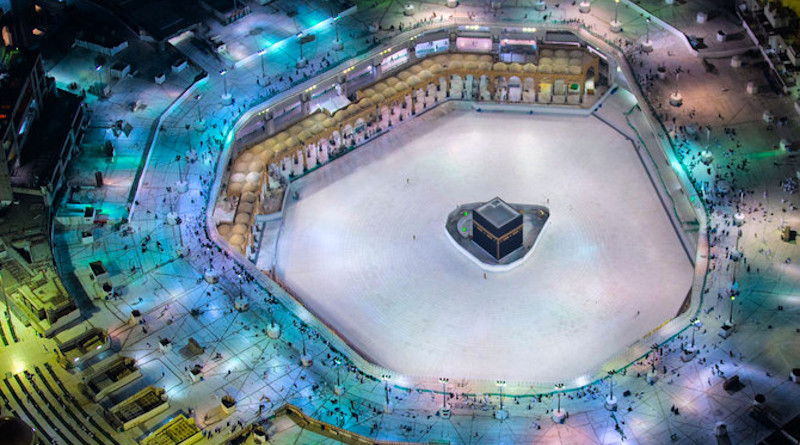Fostering Ramadan Spirit Amidst COVID-19 – Analysis
By Ahmad Saiful Rijal Bin Hassan
For Muslims, this Ramadan will be a different experience. As a precautionary measure against the outbreak of COVID-19, mosques in many parts of the world could not hold any prayers in congregation or to organise mass iftar or the act breaking fast. However, this does not prevent Muslims from celebrating the spirit of Ramadan even under challenging circumstances.
Muslims generally view Ramadan as a catalyst for positive changes in lives, whether at the individual or the community level. Apart from increasing acts of worship in this holy month, Muslims are constantly reminded to instill the values of mercy and compassion towards others. The beauty of these values can be observed in the Islamic tradition where mosques around the world opened their doors to non-Muslims to enjoy iftar together with the Muslims.
Clearly, initiatives such as mass Iftar provides a good platform for non-Muslims to understand that Islam is a religion that upholds peace and values religious harmony. It highlights that Islam enjoins peaceful coexistence among people of different faith, culture and race.
Why Mass Iftar Matters?
The tradition of mass Iftar in the month of Ramadan with people from all walks of life is a symbol of unity and harmonious living in Islam. Many iftar events are organised at mosques and attended by members of the public, regardless of their religious beliefs. This allows room for humanity to develop a sense of social intimacy and thus forging a closer relationship particularly in a plural society.
From the Muslims point of view, breaking of fast during Ramadan is a joyous occasion given by God. This is based on a prophetic narration – “There are two joys for the fasting person: the joy when he breaks his fast, and the joy of when he meets his Lord.”
Thus, the joy of breaking fast ought to be shared with the non-Muslim community. This is because values of patience and perseverance in during fasting in Ramadan can be exhibited as a part of Islamic tradition. Essentially, Muslims worldwide seek to implement the universal teachings of Islam by demonstrating the concept of Rahmah or mercy.
The nature of the mercy in Islam is a relationship that is built upon love and compassion towards God’s creation. This attitude is part of Islam’s advocacy of good and friendly relations among mankind. In addition, Islam forbids the acts of violating the spirit of good human relations.
A Different but Meaningful Ramadan
As world battle against COVID-19, there are limitations for Muslims in performing acts of worship such as praying in congregation as well as breaking fast at mosques. Nevertheless, Muslims are celebrating Ramadan in full spirit to ensure that it will not be less significant and still be meaningful.
A group of Muslim organisations in the UK and US have launched a Mini Mosque campaign. Due to the closure of mosques, the campaign seeks to encourage Muslim families to create a dedicated ‘mini’ prayer spaces that mimic mosques at their homes instead. Families are encouraged to share their pictures of the prayer space with a hashtag of #minimosque on Facebook or Instagram. More than 3900 families from various countries have pledged to join the campaign.
In Singapore, mosques produced online religious content to cater the spiritual needs of local Muslim community. Daily spiritual reminders as well as weekly Friday sermons have been streamed online on several social media platforms. The Malay-Muslims community leaders in Singapore also partook in series of virtual iftar with government leaders as well as other religious communities.
Preserving Harmony and Solidarity
Physical distancing does not hamper genuine human interaction. Religious leaders have found ways to communicate through various online platforms during this crisis. On the advent the holy month of Ramadan, a joint statement between Egypt’s Al-Azhar Institution and the Vatican was issued. The statement called upon for a Day of Prayer on May 14th for COVID-19 pandemic to end.
Addressing a virtual audience that exceeds one million people on May 14th, Pope Francis repeated the call for an interreligious day of prayer. He encouraged “believers of the different religious traditions, to pray, to fast and to do works of charity.”
Sheikh Ahmad el-Tayeb, the Grand Imam of Al-Azhar, also urged people on his Facebook post to join in the prayer “in order to eliminate this pandemic from the entire world.” He reiterated that all humanity is united under one banner including different races and religions and praying to God for a path towards salvation from this pandemic is a necessity.
This initiative has gained support of state leaders and organisations from around the world. From Indonesia to Africa, Middle East to Europe, many have responded with a prayer for an end to the current calamity as well as bringing humanity closer together even under lockdown measures.
Conclusion
Despite challenges faced in the Ramadan, Muslims embraced changes and adopted alternative ways of expressing care and unity as well as strengthening ties among people from different beliefs and races.
Faithful Muslims who are observing Ramadan in current pandemic situation can learn a number of lessons from the restrictions imposed, but it certainly does not prevent them from celebrating the spirit of Ramadan and sharing the joy of happiness with their non-Muslim friends.
*Ahmad Saiful Rijal Bin Hassan is an Associate Research Fellow at the S. Rajaratnam School of International Studies (RSIS), Nanyang Technological University, Singapore.

